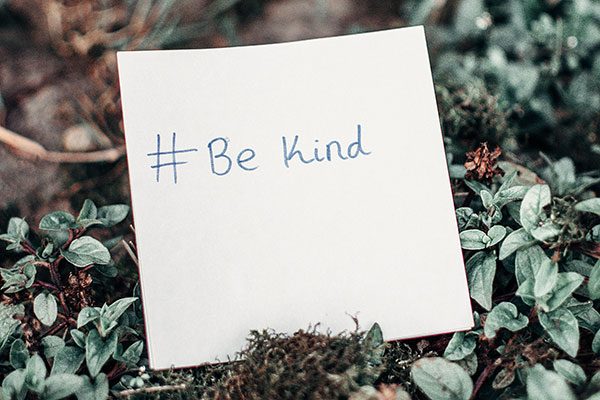Breadcrumb
Be Kind to Humankind Week is a global celebration that takes place the last week of August each year. The
week is intended to promote kindness, happiness, and harmony between all walks of life. But did you know that being kind can impact your health too?
Is it true that you can become healthier by practicing kindness?
The short answer is, yes. Kindness creates connectivity, helps us relate to others, and increases positive relationships with our family, friends, and people we encounter daily throughout our lives.
The long answer is supported by well-studied research. “Being kind can positively change your brain,” says Kristin Francis, MD, a psychiatrist at Huntsman Mental Health Institute at University of Utah Health. “Thinking kind thoughts toward someone or doing something nice for someone boosts dopamine and serotonin, the neurotransmitters in the brain that give you those positive feelings of pleasure, happiness, and well-being.”
"Being kind can positively change your brain."
Serotonin is a hormone in your brain that reduces anxiety and the feelings associated with stress. When you are kind, your brain is increasing the output of serotonin. Combined with the release of oxytocin (the “connectedness” hormone), which enhances feelings of mutual respect and positive regard toward others, kindness literally improves your mental health.
Being kind has an impact on the people around us. When showing compassion and kindness, you then help others by encouraging them to respond in nice ways towards others—creating a chain reaction of positivity.
Kindness can lessen anxiety and boost your mood. Have you ever noticed how it makes you feel when you buy someone a gift or give them a compliment? This feeling is supported by science—when you are nice to others and thinking kind thoughts toward them, your emotional mood becomes more positive. Researchers have found that those who “experience more positive moods have less anxiety and tend to view situations more optimistically,” Francis says.
Kindness does help you live longer, and the saying “kindness warms your heart” is true. Researchers have shown that when we are kind and our bodies release the oxytocin hormone, blood vessels expand, blood pressure reduces, and your heart is protected. Oxytocin deepens our relationships, helps us feel more connected to others, and supports us in building a network of family and friends, which in turn results in a longer and healthier life.
Kindness creates connectivity, helps us relate to others, and increases positive relationships.
It is always important to practice self-compassion. Giving yourself a daily “pep talk,” recognizing your own achievements, or writing down what you are grateful for every morning or evening are simple ways to practice self-compassion. It may feel awkward or challenging at first, but with practice, we become better at positive self-talk and grace. “Love yourself first”—it’s true. By loving yourself first, you can inspire others to love themselves and the people in their lives.
Practicing kindness, gratitude, self-love, and compassion is always important— this intentional behavior creates a trickle-down effect. If you are kind to yourself and others, people start taking your lead. Before you know it, the world is a kinder place.
